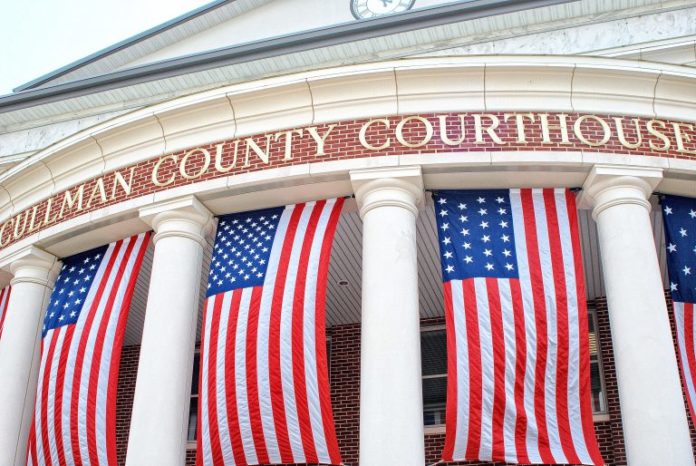CULLMAN, Ala. – During the COVID-19 shutdown, crime and civil problems continue, and so must the courts. On April 6, Cullman County Presiding Judge Gregory Nicholas issued an administrative order governing how the courts can proceed with their business while maintaining social distance through “virtual court hearings” held via the Zoom online group communication application or other means, including even telephones. The order covers all types of regular criminal and civil proceedings not requiring a jury, and lays out procedures for pre-hearing communication, presentation of evidence (including physical evidence), issuance of subpoenas, calling of witnesses, receiving pleas and even proper attire to “preserve the dignity of the occasion and (promote) public trust and confidence in the judicial proceeding.”
Judge Nicholas’s order is as follows:
ADMINISTRATIVE ORDER 2020-07.2
A Revised Order Relating to Virtual Court Hearings
WHEREAS, the Alabama Supreme Court issued an administrative order dated March 13, 2020 that “[a]ll in-person proceedings in all state and local courts in Alabama, including, but not limited to, proceedings in the circuit court, district court (including cases on the small claims docket), juvenile court, municipal court, probate court, and appellate courts, are suspended beginning Monday, March 16, 2020 through Thursday, April 16, 2020, subject to [certain] exceptions”; and
WHEREAS, the Alabama Supreme Court’s administrative order expressly provided that “…all judges and clerks are urged to limit in-person courtroom contact as much as possible by utilizing available technologies, including electronic filing, teleconferencing and videoconferencing …” and further provided that “[t]his order expressly does not prohibit court proceedings by telephone, video, teleconferencing, or other means that do not involve in-person contact…” and the Supreme Court order also temporarily suspended any rule that limits a judge’s ability to consider testimony by use of audio or video conferencing during the period of suspension; and
WHEREAS, Alabama Supreme Court Chief Justice Parker issued an order dated March 24, 2020 for court reporters in a court proceeding using audio video communication technology to administer oaths to witnesses who are not physically present before the court reporter; and for trial courts to consider the testimony of those witnesses as evidence; and
WHEREAS, the Alabama Supreme Court issued an administrative order dated April 2, 2020 that adopted the administrative orders previously entered by Chief Justice Parker dated March 16, 2020, March 18, 2020 and March 23, 2020. Further, the Alabama Supreme Court’s April 2, 2020 order provided that “[a]ny deadlines in the Court’s Administrative Orders that are set to expire on April 16, 17 or 20, 2020 are hereby extended through April 30, 2020, and the orders shall remain in full force and effect through April 30, 2020.”; and
WHEREAS, after consultation with all other judges of this judicial circuit, the following rules are deemed necessary for the local implementation of virtual court proceedings; It is therefore ORDERED that until April 30, 2020 or during any subsequent period of time the Alabama Supreme Court shall suspend or partially suspend in-court proceedings and allow for court hearings to be conducted by audio conference or video conference, the following rules and guidelines are hereby adopted and shall be followed by all parties appearing for any hearing or trial that is presently pending or hereinafter filed in this 32nd Judicial Circuit in which sworn testimony is taken by the use of audio or video conferencing equipment.
- Definitions:
The term “video conference” means the use of any interactive technology that sends and receives video, audio, and data so that two or more individuals can communicate with each other contemporaneously from different locations using cameras, microphones, speakers, and computer monitors or screens that allow the individuals participating to view and hear each other.
The term “audio conference” means the use of any interactive audio technology, including a cell phone or telephone, that permits two or more individuals to contemporaneously speak with each other from different locations.
- Each judge of this judicial circuit shall have the discretion to require that any non-jury court proceeding be conducted by audio conference or video conference. Every court proceeding conducted by the use of audio conference or video conference shall conform to the requirements of the administrative orders issued by the Alabama Supreme Court and Alabama Supreme Court Chief Justice Parker that are referenced above. Such proceedings shall hereinafter be referred to as “virtual court hearings.”
- Virtual court hearings may be scheduled and held in all non-jury cases, including, but not limited to, pendente lite hearings in domestic relations cases, domestic relations trials, contempt hearings, modification hearings, civil motion hearings, protection from abuse hearings, child support hearings, parentage hearings, hearings for injunctive relief, civil non-jury trials, small claims proceedings, traffic hearings; all juvenile proceedings, including but not limited to, shelter care hearings, adjudicatory hearings, dispositional hearings, termination of parental rights hearings, permanency hearings, juvenile court review hearings; criminal proceedings, including, but not limited to, initial appearance hearings, arraignments, preliminary hearings, hearings on motions to reduce bond, hearings on motions to revoke bond, probation hearings, probation revocation hearings, youthful offender hearings, hearings on habeas corpus petitions and petitions for post-conviction relief. The above list is not intended to be an exclusive or exhaustive list but is offered merely as examples of the kinds of proceedings that may be conducted by use of video conferencing or audio conferencing.
- All virtual court hearings with video capabilities must be conducted with Zoom software unless the judge presiding over the hearing authorizes the use of a different software or technology that has been deemed trustworthy and reliable for court use.
- All counsel of record and all self-represented litigants shall be timely notified of the date and time of a scheduled virtual court hearing via Alacourt.com, e-mail, regular mail or as otherwise allowed by the Alabama Rules of Court or by statute.
- Subpoenas.
A subpoena issued for the appearance of a witness at a virtual court hearing shall clearly state the address that the witness will need to appear to offer sworn testimony. Typically, this location will be the law office address of the attorney who requested the subpoena but may be any location designated in the subpoena as permitted by this order. The subpoena shall also inform the witness that he or she has the option of testifying from his or her home or other location of his or her choice, provided the witness has: (i) a computer, smartphone, tablet, or other device with video conference capabilities (camera, microphone and monitor), (ii) free Zoom video conference software or such other video conference software permitted by the trial judge, (iii) an e-mail address and (iv) internet service with sufficient broadband for a video conference. If the virtual court hearing has been designated by the trial judge as an audio virtual court hearing only, video capability is not required. The subpoena also shall instruct the witness that if he or she intends to testify from his or her home, the witness must immediately contact the law office or person requesting his or her appearance to provide an email address and telephone number where the witness can be reached during the scheduled virtual court hearing. It is the responsibility of the person requesting the subpoena to confirm each of his or her witnesses’ ability to participate in a video conference or audio conference. If the witness is not able to participate in the virtual court hearing from his or her home or other selected location, the person issuing the subpoena shall decide whether the witness is material and, if so, it is the responsibility of the person issuing the subpoena to make arrangements for the witness to appear at a location having sufficient video conference or audio conference capabilities.
At least seven days prior to the scheduled virtual court hearing, each party shall provide the court clerk with a list of witnesses who will be called to testify. The list shall include: (i) the name of each witness, (ii) telephone number where the witness can be reached at the time of the virtual court hearing and (iii) the e-mail address of each witness expected to be called as a witness. If the identity of a witness is unknown to a party seven days prior to the hearing, the identity, phone number and e-mail of the witness shall be provided to the court clerk as soon as it is determined the witness may testify.
If the witness sequestration rule is invoked at a virtual court hearing, all witnesses testifying must be at different physical locations and unable to hear the testimony of other witnesses, except as may be otherwise agreed by the parties on the record. If necessary, witnesses may be telephoned by counsel of record or by a party and prompted to log onto the video conference or audio conference when it is time for the witness give his or her testimony. A witness may also be placed on hold by the judge at any time that a discussion is needed to be held out of the presence and hearing of a witness.
Notwithstanding the foregoing, a witness need not appear at a location other than his or her residence if, at the time of the scheduled virtual court hearing, the witness is: (1) running a fever, (2) is in quarantine due to possible exposure to someone testing positive for COVID-19, (3) is over the age of 60 years or has an underlying medical condition that would create a greater risk to the witness if exposed to COVID-19, (4) if sick, or (5) if a general State-wide shelter in place order has been issued by the Governor of the State of Alabama or if a similar shelter in place or quarantine order has been issued by a local governmental entity having authority to issue such orders. Further, each subpoena issued for a virtual court hearing shall contain a prominently displayed notice that “all witnesses are required to have in their possession a government issued photo ID to establish his or her identity at the virtual court hearing.” Before a witness is administered his or her oath and allowed to testify, the government issued photo ID shall be shown to the court reporter who is transcribing the proceeding or to the judge presiding over the proceeding, if no court reporter is present.
- All counsel of record and all self-represented litigants are hereby ordered to provide written verification of their e-mail addresses to the court clerk within 10 days from the entry of this order and a telephone number, if not previously provided. The court clerk shall provide a copy of this order to all attorneys of record and to each self-represented party who does not currently have an e-mail and telephone number listed in the case record.
In the event an attorney wishes to withdraw from a case, the motion to withdraw shall contain a certification that the attorney has notified his or her client of the requested withdrawal, that the client has been informed of all pending hearings or trial dates, including virtual court hearing dates, and that the attorney has notified the client that it is the client’s responsibility to immediately contact the court clerk to provide a current regular mailing address, telephone number and e-mail address for future court hearings, including virtual court hearings. If counsel is unable to communicate with his or her client, the attorney shall provide a brief account of attempts made to notify the client of his or her intent to withdraw and of the client’s responsibility to provide the court clerk’s office with a current mailing address, telephone number and e-mail address.
- All persons appearing for a virtual court hearing at an office or other location shall adhere to the protocols adopted by the Centers for Disease Control to limit the transmission of COVID-19, including maintaining a social distance of at least six feet, to the fullest extent practicable.
- 9. Communication Between Counsel and Self-Represented Parties Prior To Filing Request For Virtual Court Hearing.
If a party wishes to request that a case be set for a virtual court hearing that has not already been set, counsel for the party making the request shall first confer with counsel of record for all other parties involved (or if a party is a self-represented party, then directly with the self-represented party) and determine whether all parties consent to holding a virtual hearing pursuant to the requirements mandated in the administrative orders referenced above and this local order. Each party shall thereafter file a notice with the court clerk, giving consent to the virtual court hearing or objecting to the hearing. In the event an objection is made to the virtual court hearing, the party making the objection shall state specifically each and every basis for the objection, and the judge presiding over the case shall make a determination whether the virtual court hearing should be conducted. The provisions of this paragraph nine shall not apply to those types of hearings exempted from the in-person suspension orders of the Alabama Supreme Court referenced above. Those in-person hearings will be held at the courthouse or such other facility designated in the order setting the matter for hearing unless: (i) all parties to the proceeding waive their right to an in-person court proceeding and agree to a virtual court hearing, or (ii) the judge presiding over the case makes a determination that a virtual court hearing is necessary to safeguard the public health and to the protect the health of those individuals involved in the court proceeding.
With respect to all civil cases, including small claims cases, and domestic relations cases, a party filing a request to schedule a virtual court hearing shall first certify to the court in writing that he or she has made a good faith attempt to communicate with the opposing attorney and each self-represented party in an effort to resolve the matters in dispute prior to filing a request to set for hearing and shall briefly describe the efforts made to communicate with opposing counsel or any self-represented party. This requirement shall not apply to protection-from-abuse proceedings.
Pre-trial Conference. Counsel of record and any self-represented party may also request that a pre-trial virtual court hearing or telephone conference call be held with only counsel of record and any self-represented party to discuss the scheduling of discovery, to narrow the issues that may be in dispute, or to discuss other matters that may facilitate a settlement of the case or matter in dispute.
- Procedure for Virtual Court Hearings.
The judge assigned a case will schedule a virtual court hearing and notice of the date and time for the proceeding will be provided to all parties by Alacourt.com, by regular mail and by e-mail, or as otherwise allowed by the Alabama Rules of Court, statute or administrative order of the Alabama Supreme Court. Counsel shall contact his or her client and arrange for the client and all the client’s witnesses to appear at the attorney’s office or other designated location AT LEAST 30 minutes before the proceeding is scheduled to commence. A self-represented party shall do likewise with respect to all witnesses he or she expects to call at the virtual court hearing. Counsel for the parties and any self represented party shall also ensure that all necessary equipment and software are in proper working order prior to the time of the scheduled hearing and that bandwidth is adequate for video conference. Self-represented litigants shall contact the clerk’s office at least seven days prior to the scheduled virtual proceeding, except when the times have been shortened due to the necessity of scheduling an emergency hearing, and notify the clerk in writing whether he or she has the ability, equipment, software and bandwidth required to participate in the virtual court hearing and, if so, shall confirm that the clerk has the e-mail he or she will use to connect with Zoom or other approved software and a telephone number that the party can be reached during the virtual court hearing, if it should be necessary. If a self-represented litigant notifies the clerk in writing that he or she does not have the knowledge, equipment, software or bandwidth necessary to proceed with the virtual court hearing, the judge presiding over the case may hold a telephone conference with all self-represented parties and counsel of record to determine the best way to proceed. The judge and counsel of record and any self-represented party shall explore other possible options for conducting a virtual court hearing, including the use of the local access computer in the Cullman County law library and any other available local facilities that may be equipped with the appropriate technology for virtual court hearings. Failure to attend the conference or cooperate in the virtual hearing may result in contempt proceedings being initiated against the party, attorney or other person ordered to attend or participate.
It is the responsibility of the parties, whether represented by counsel or representing themselves, to have all of their material witnesses present at a virtual court hearing. Each witness who appears must have a government issued photo ID with them at the time of the proceeding or the witness will not be allowed to testify, except by consent of all parties or with another acceptable proof of identification. Shortly before the virtual court hearing is scheduled to begin, counsel of record and any self-represented party shall contact each of their respective witnesses at the telephone numbers provided by them and instructed to be on standby to give their testimony.
At the time the virtual court proceeding is scheduled to begin, the judge or a member of the judge’s staff will connect with all parties and counsel of record using Zoom software or such other software that has been approved. Once it has been determined by the judge that all necessary individuals are present and able to see and hear what is transpiring at the proceeding, the hearing shall progress as though the parties were physically present, subject to the rules specifically adopted for virtual court hearings.
Virtual Court Hearings with Court Reporter. If a court reporter will be transcribing the virtual court hearing, before testimony or other evidence is taken, the judge shall obtain the verbal consent of all the parties and attorneys on the record to have the court reporter record the proceedings to create a record, even though the court reporter may not be physically present in a courtroom as provided in Section 12-17-275, Ala. Code 1975. Once all parties and counsel of record consent, the official court reporter shall be present through-out the video conference and able to see and communicate with every witness who appears remotely using Zoom software or such other video conference software that has been approved by the judge presiding over the virtual court hearing. Prior to a witness testifying, the court reporter shall ascertain the identity of the witness and administer the oath to the witness remotely. At all times during the witness’s testimony, the court reporter shall be able to see, hear and communicate with the witness who is testifying. The court reporter shall record the video conference court hearing just as though the hearing were being conducted with all parties and counsel appearing in person, but if the court reporter is requested to transcribe the record, the court reporter’s transcript shall reflect in the transcript that the transcript was made with all individuals appearing remotely with video conferencing, except for any individuals who may have been physically present with the court reporter during the virtual court hearing.
When the testimony of a witness is needed, the judge or a member of the judge’s staff will send an invitation to the witness who is being called to testify by a party or remove the party from Zoom hold. Counsel of record or a self-represented party may contact his or her witness by telephone if the attempt to connect the witness to the video conference is unsuccessful and attempt to determine the cause of the problem and assist with possible solutions. At the conclusion of a witness’s testimony, the court shall inquire whether the witness may be excused or released from any subpoena. If a party indicates that further testimony from the witness may be required, the witness will be notified by the court to remain on call at his or her present location pending further instructions from the party who has indicated further testimony may be needed from the witness.
Virtual Court Hearings in Which No Court Reporter is Present. In any virtual court hearing in which a court reporter is not present to record the proceeding, the hearing may be recorded in any manner permitted by statute, rule or administrative order of the Alabama Supreme Court. Before the virtual court hearing begins, the judge shall explain to all counsel of record and to the parties the process that will be used to make a record of the hearing and obtain the verbal consent of all parties to the recording method being employed. Further, all witnesses appearing for the virtual hearing may be administered the oath by the judge presiding over the hearing or as otherwise permitted by statute, rule or administrative order of the Alabama Supreme Court and the consent of all parties to this procedure shall also be obtained prior to taking evidence in the virtual court hearing.
Recordings Prohibited. No electronic device or other means may be used by a party, attorney, witness, or any other person to capture images, videos, or sound recordings of any portion of a virtual court hearing without the express written consent of the judge presiding over the judicial proceeding. Any person violating this rule may be held in contempt of court.
Exhibits. No later than seven days before a scheduled virtual court hearing (emergency hearings excepted), counsel for the parties and any self-represented litigant(s) shall confer with one another regarding the use of exhibits at the virtual court hearing. Consistent with the duty of client representation, counsel and any self-represented litigant shall discuss potential exhibits that may be introduced at the virtual court hearing and stipulate as to the authenticity and admissibility of any proposed exhibit, to the extent they are willing to do so. No authentication or other foundation will need to be established at the virtual court hearing for any exhibit the parties have agreed may be allowed into evidence by their stipulation.
Exhibits Capable of being Displayed in an Electronic Format. Each party shall cause an exact copy to be made of all photographs, videos and documents intended to be shown to a witness or offered into evidence at a virtual court hearing. The original and each copy of the original shall be pre-marked with the same number, with the first exhibit being denominated as exhibit number one and each original and copy thereafter numbered sequentially. Each marked exhibit shall also clearly identify the party who will be offering the exhibit. All originals shall be retained by the proffering party and copies of the exhibits (hereinafter referred to as “court copies”), shall be placed in either a sealed envelope or sealed box and mailed or delivered to the court reporter who will transcribe the virtual court hearing. The court reporter shall keep the court copies in a secure location and shall not open them until the beginning of the virtual court hearing. Once the virtual court hearing has begun, the court reporter shall unseal the court copies for the judge to view during the course of the hearing. If a court reporter will not be present at the virtual court hearing to record the proceeding, all court copies shall be delivered to the judge presiding over the hearing, who will open the court copies and keep them secure.
Physical Exhibits not capable of being reduced to Electronically Stored Format and Exhibits used in Rebuttal. Notwithstanding the foregoing, any exhibit that is not capable of being reduced to an electronically stored format need not be delivered to the court reporter or judge prior to the commencement of the virtual court hearing. Examples of such exhibits include physical objects such as weapons, equipment, clothing, bullets, etc. Such exhibits may, if properly authenticated and otherwise admissible, be allowed into evidence at the virtual court hearing as permitted by the Alabama Rules of Evidence. The court may also allow exhibits offered in rebuttal to be introduced at the virtual court hearing even though the exhibits have not been provided to the court in advance of the hearing. Any physical or rebuttal exhibit offered by a party shall first be appropriately marked and shown to opposing counsel and to any self-represented party before it is offered into evidence. Prior to a virtual court hearing’s concluding for the day, each party shall place all of their exhibits that have been admitted into evidence or disallowed by the court that day into a large manila envelope(s) or box and the envelope(s) or box sealed in view of the judge, court reporter, if present, and all other parties. Each exhibit envelope or box shall be accompanied by a certification from the offering party that the exhibits have not been altered or changed in any way once placed in the envelope or box and sealed in the presence of the court and other parties. The admitted and excluded exhibits shall be delivered with the seal unbroken to the court reporter recording the virtual court hearing as soon as possible after the hearing recesses each day. If no court reporter is present to record the proceeding, then the exhibits shall be delivered with seal unbroken to the judge presiding over the virtual court hearing at the end of each day’s proceeding.
Procedure for Presenting Electronically Stored Exhibits at Virtual Court Hearing. Parties wishing to offer a document, photo, or video as an exhibit at the virtual court hearing shall cause a true and exact copy of the document, photo or video to be created and stored electronically on the computer or other device that will be used at the virtual court hearing. Before an authenticating witness is brought into a virtual court hearing or while the witness has been placed on Zoom hold, the party seeking the admission of the exhibit into evidence shall use the share feature available on Zoom (or such other software being used with permission of the court) to show the marked exhibit to opposing counsel and any self-represented litigant. Once the exhibit has been shown to opposing counsel and any self-represented litigant, the authenticating witness may be removed from Zoom hold and returned to the virtual court hearing.
Retention of Exhibits at Conclusion of the Virtual Court Hearing. All exhibits admitted into evidence during the virtual court hearing and all exhibits that have been offered into evidence by a party and not admitted into evidence shall be retained by the court reporter in a secure location for the same period of time prescribed for in-court proceedings. If no court reporter is present to record the proceeding, the judge presiding over the virtual court hearing will retain the exhibits as provided by law.
Attire. Appropriate courtroom attire, whether in a traditional courtroom or a virtual one, helps preserve the dignity of the occasion and promotes public trust and confidence in the judicial proceeding. Therefore, judges, attorneys, parties and witnesses should dress for virtual court hearings just as they would dress if they were appearing in a traditional courtroom. The judge presiding over a virtual court hearing will determine the specific dress code for his or her court.
- Juvenile and Youthful Offender Proceedings.
Virtual court hearings in juvenile and youthful offender cases shall proceed in a manner consistent with the procedures described in the above paragraphs, subject to the additional safeguards provided herein. The judge presiding over the case shall initiate the virtual court hearing using additional privacy measures provided by Zoom to make the virtual court hearing private, including the use of PIN numbers that are only available to necessary participants. However, despite all reasonable efforts to ensure that privacy and confidentiality are preserved with encryption, it is widely understood that no software can possibly be deemed perfectly secure from a breach and that if a breach were to occur a computer hacker could eavesdrop on a video conference or otherwise gain access to a virtual court hearing. Therefore, as an additional precaution, it is ordered that in all juvenile and youthful offender proceedings conducted with video conference, only the initials of the youthful offender or juvenile shall be used and no one at the hearing shall disclose any information that could identify the juvenile or youthful offender, except to the extent that may be reasonably necessary given the nature of the case. Further, prior to the commencement of each juvenile or youthful offender virtual court hearing, the court shall inform all lawyers, parties, guardians ad litem, witnesses and other participants at the hearing of this rule.
Further, with respect to juvenile proceedings in which a child is not physically present with his or her attorney at the time of the virtual court hearing, the child shall be afforded an opportunity at any time during the virtual court hearing to communicate privately with his or her attorney either in person or by use of a phone or video software that ensures confidentiality of the communication and the child shall be informed by the court of this right before the virtual hearing commences. Virtual court 72-hour detention hearings, or pleas taken at these hearings in juvenile delinquency cases, must meet the legal requirements set out by Order of the Supreme Court of Alabama dated June 22, 2006 (and extended by Orders dated June 3, 2008, April 19, 2011, September 17, 2014, and April 17, 2017), the Court’s Guidelines for Videoconferencing Detention Hearings (Temporary), and the Alabama Judicial System Policies, Procedures and Guidelines Governing Videoconferencing Appearances in Juvenile Courts which was approved by memorandum dated September 4, 2009.
- Criminal Proceedings Generally.
Virtual court hearings in criminal cases shall proceed in a manner consistent with the procedures described in the above paragraphs, subject to the additional safeguards provided herein when a defendant is not physically present in the same room with his or her attorney during a virtual court hearing. A defendant in any criminal case may waive his or her right to be present at a virtual court hearing. However, if a defendant is incarcerated in the Cullman County Detention Center and does not waive his or her right to be present, the defendant shall be brought into the detention center’s on-site video conferencing room before the hearing begins and shall be connected to the virtual court hearing so that he or she is capable of hearing and seeing everything that transpires during the virtual court proceeding. Further, the defendant shall be afforded an opportunity at any time during the virtual court hearing to communicate privately with his or her attorney either in person or by use of a phone or video software that ensures confidentiality of the communication and the defendant shall be informed by the court of this right before the virtual court hearing commences.
- Procedure in Criminal Cases for Guilty Plea Hearings.
If the State and Defendant reach a plea agreement, the agreement shall be reduced to writing and signed by all parties and counsel of record. The attorney for the defendant shall submit the signed agreement to the judge assigned to hear the case, along with all other properly executed forms required for the court to accept the defendant’s guilty plea. Once it has been determined that all necessary paperwork has been submitted, the judge will schedule a virtual court hearing date and time and notice provided to all parties.
For Defendants on bond at time of Plea. If a defendant is not incarcerated, the attorney for the defendant shall contact his or her client and arrange for the client to appear at his or her attorney’s office AT LEAST 30 minutes before the scheduled time for the hearing or at some other location designated by the attorney. The attorney for the defendant shall verify that all necessary equipment and software are in proper working order prior to the time of the scheduled hearing, including the equipment the defendant will be using if the defendant is appearing at a location other than the attorney’s office. Either the judge taking the guilty plea or a member of the judge’s staff will connect with the defendant, the defendant’s attorney and the Cullman County District Attorney’s Office, (unless the District Attorney waives his right to be present) using Zoom software or other approved software. Once it has been determined by the judge that all necessary individuals are present and able to see and hear what is transpiring at the plea hearing, the judge shall proceed to take the defendant’s plea after first determining that the defendant consents to enter the plea by video conference, that the plea is freely, intelligently and voluntarily made and all other requirements for entry of the guilty plea have been satisfied. Where available, the official court reporter shall be present through-out the video conference proceeding and able at all times to see and hear the defendant who is entering a guilty plea and shall record the hearing just as though the hearing were conducted with all parties and counsel appearing in person. It shall be the responsibility of the prosecuting attorney to contact any victim that may require notification of the plea hearing and arrange for the victim to appear at the District Attorney’s office for the virtual court hearing or in such other location approved by the judge accepting the guilty plea.
If a plea agreement calls for a defendant to serve a jail or prison sentence, the Sheriff shall be informed in advance of the date, time, and physical location of the defendant at the time the plea is entered so that a deputy will be on hand to take the defendant into immediate custody. If the plea agreement calls for probation or an application for probation has been made, the defendant shall immediately report to his or her probation officer.
For Incarcerated Defendants. The general procedure outlined above for taking guilty pleas by video conferencing shall apply when a defendant is incarcerated in the Cullman County Detention Facility at the time of his or her guilty plea. The Cullman County Detention Center shall utilize Zoom software at its on-site video conference room, which the court hereby designates as a temporary courtroom, so that pleas can be taken without defendants being transported to the courthouse. Other video conferencing software may also be used at the discretion of the judge accepting the guilty plea. The attorney for the defendant may appear with the defendant at the detention center or may appear from another location, provided that the defendant’s right to communicate privately with his or her attorney is preserved. Each defendant entering a guilty plea shall be afforded an opportunity at any time during the plea to communicate privately with his or her attorney either in person or by use of a phone or video software that ensures confidentiality of the communication.
- Public Access to Some Criminal Proceedings.
Because Alabama law recognizes the existence of a general First Amendment right of the public to have access to some criminal hearings, it is hereby ordered that any person may make a request for access to a criminal virtual court hearing that relates to matters that have traditionally been open to the public. The individual making the request shall be given permission to enter any virtual court hearing held in this circuit as a spectator only, unless the defendant or the State asks that the hearing be closed and “advances an overriding interest that is likely to be prejudiced” if the hearing is made open to the public. Press–Enterprise II, 478 U.S. at 7, 106 S.Ct. at 2739. Ex parte Birmingham News Co., 624 So.2d 1117, 1124–25 (Ala. Crim. App. 1993).
An individual may request access to a criminal virtual court hearing by filing a written request with the court clerk. The individual making the request shall provide the court clerk with the defendant’s name, the case number, if known, as well as the requester’s e-mail address. Notice of the request shall be provided to the prosecutor and defendant and if no objection is filed within 14 days of the notice, the requester will receive an invitation to attend any virtual court hearing held in the case that involves matters that have traditionally been open to the public. If an objection is made by a party within the time provided, the court shall schedule a hearing to determine whether the request for access should be denied and the hearing closed to the public. The court also finds that there is a compelling reason to implement this special access rule due to the community safety threat posed by COVID-19 and finds that any burden placed on an individual by these procedures is substantially outweighed by the need to protect the public from further spread of COVID-19.
Access in Civil Cases. Any person making a request to gain access to a virtual court hearing in a civil case may also use the same procedures described in the above paragraphs. After notice to all parties and an opportunity to be heard, the court will determine whether access to the civil virtual court proceeding should be permitted under existing laws.
- Audio, Video or other Technical Problems.
If the judge presiding over a virtual court proceeding determines at any time that the audio or video connection is so poor as to interfere with the fair administration of justice, the hearing shall be postponed until such time as a better connection can be obtained or the matter can be set for an in-person court proceeding. However, it shall be the responsibility of a party or counsel for a party to promptly inform the court if there has been a disruption at their end of the communication that substantially interferes with his or her ability to see or hear what is occurring during the video conference. An objection to the quality of an audio conference or a video conference should be made at the time the connection is substantially impaired but must be made to the court on the record before the virtual court hearing has concluded. Any objection to the quality of the audio conference or video conference made thereafter, will be deemed untimely.
- It is ORDERED that the Circuit Clerk shall provide the Alabama Administrative Office of Courts with a copy of this Order and a copy shall also posted on the Cullman Courts official website and in such other places that are reasonably calculated to provide the public with notice of this order.
Copyright 2020 Humble Roots, LLC. All Rights Reserved.

































